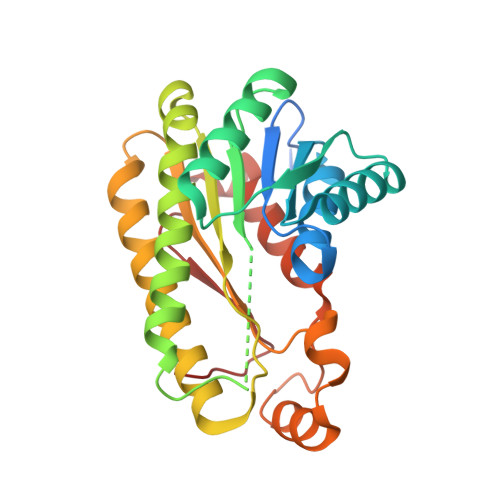Discovery of an Allosteric Inhibitor Binding Site in 3-Oxo-Acyl-Acp Reductase from Pseudomonas Aeruginosa
Cukier, C.D., Hope, A., Elamin, A., Moynie, L., Schnell, R., Schach, S., Kneuper, H., Singh, M., Naismith, J., Lindqvist, Y., Gray, D., Schneider, G.(2013) ACS Chem Biol 8: 2518
- PubMed: 24015914
- DOI: https://doi.org/10.1021/cb4005063
- Primary Citation of Related Structures:
4AFN, 4AG3, 4BNT, 4BNU, 4BNV, 4BNW, 4BNX, 4BNY, 4BNZ, 4BO0, 4BO1, 4BO2, 4BO3, 4BO4, 4BO5, 4BO6, 4BO7, 4BO8, 4BO9 - PubMed Abstract:
3-Oxo-acyl-acyl carrier protein (ACP) reductase (FabG) plays a key role in the bacterial fatty acid synthesis II system in pathogenic microorganisms, which has been recognized as a potential drug target. FabG catalyzes reduction of a 3-oxo-acyl-ACP intermediate during the elongation cycle of fatty acid biosynthesis. Here, we report gene deletion experiments that support the essentiality of this gene in P. aeruginosa and the identification of a number of small molecule FabG inhibitors with IC50 values in the nanomolar to low micromolar range and good physicochemical properties. Structural characterization of 16 FabG-inhibitor complexes by X-ray crystallography revealed that the compounds bind at a novel allosteric site located at the FabG subunit-subunit interface. Inhibitor binding relies primarily on hydrophobic interactions, but specific hydrogen bonds are also observed. Importantly, the binding cavity is formed upon complex formation and therefore would not be recognized by virtual screening approaches. The structure analysis further reveals that the inhibitors act by inducing conformational changes that propagate to the active site, resulting in a displacement of the catalytic triad and the inability to bind NADPH.
Organizational Affiliation:
Department of Medical Biochemistry and Biophysics, Karolinska Institutet , 17177 Stockholm, Sweden.















